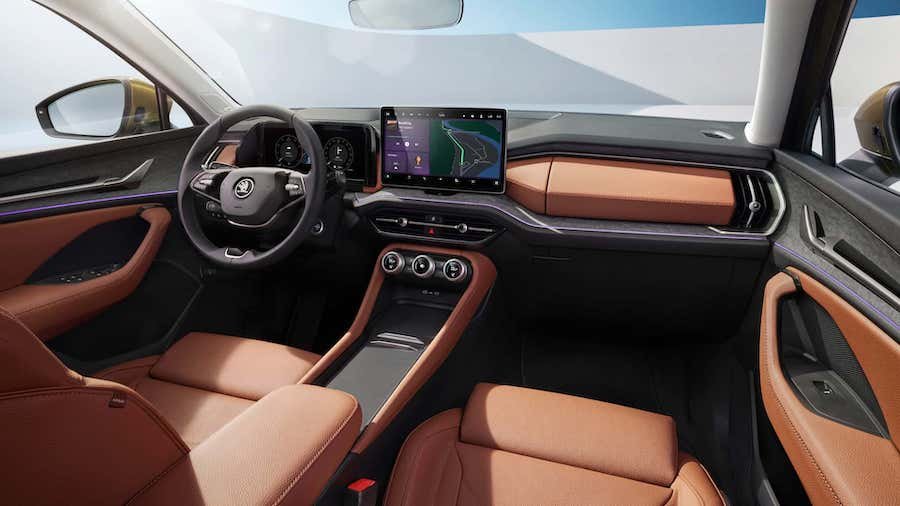Total overhaul for interior of 2024 Skoda Kodiaq PHEV

The interior of the next-generation Skoda Kodiaq has been previewed by the Czech firm, with new images revealing that it will retain physical dial controls for critical functions.
The three dials, sandwiched between the centre console and the dashboard, can be customised to alter different functions. Official images show the system set up to manage the front occupants’ climate settings on each respective side, with stereo volume between the two.
The dials on either side of the front occupants can manage the cabin temperature, seat heating or seat ventilation, according to user preference. The central controller, meanwhile, can alter fan speed, air direction, the sound system’s volume, the chosen driving mode, or the sat-nav map’s zoom.
The new images also reveal that the Kodiaq will feature a large 12.9in infotainment touchscreen and a 10in digital instrument display.
Moreover, the automatic gear selector has been moved from the centre console to a stalk on the steering wheel, freeing up more leg room for front occupants.
Connectivity has also been emphasised in the design of the new Kodiaq. USB-C ports feature on the rear-view mirror and centre console; into which a 15W wireless phone-charging box has been integrated.
First drive: 2024 Skoda Kodiaq prototype review
Even the most iconic movie trilogies (including The Godfather and The Dark Knight) tend to run out of puff by the third instalment.
But it’s different with Skoda SUVs. The Czech maker released a strong three-part series, with the Skoda Kodiaq being the equivalent of a great debut movie, followed by the highly successful Skoda Karoq and Kamiq. Now, the firm is focusing its efforts back where it all started and a new Kodiaq will arrive in the first quarter of 2024.
The second-generation large SUV will continue to share parts with other Volkswagen Group models, including the new VW Tiguan, which we've also driven in prototype form. Prices, trim levels and equipment will be confirmed towards the end of this year, but the choice of a standard Kodiaq and a sportier-looking SportLine version remains, and most versions will come with seven seats. A hotter Skoda Kodiaq vRS version is expected to join the range about a year later.
At launch, there will be two petrol and two diesel options. And since 97% of Kodiaq buyers went for the smooth-shifting DSG gearbox, all engines will have this as standard.
The entry-level 148bhp 1.5-litre petrol uses the latest Evo2 mild-hybrid tech and is more refined than before. Not only is it quieter under acceleration, but the switch to fuel-saving two-cylinder mode is also even smoother. Performance is adequate rather than sparkling when you’re pressing on, but it’s sufficient for running all those local family errands. Besides, there’s a 201bhp 2.0-litre TSI petrol if you want more oomph.
The entry-level 148bhp 2.0-litre diesel, with its muscular low-end grunt, feels more capable for hauling a Kodiaq packed with kids and clobber. We suspect it’s a touch overkill for mostly urban use, but it’s a great cross-country choice.
The top-tier 190bhp diesel isn’t as sweet, feeling less urgent and revving more slowly, but less diesel clatter filters through into the cabin and, perhaps more importantly, it is the only Kodiaq to come with seven seats and four-wheel drive.
Arriving a little later, in summer 2024, a plug-in hybrid will be available for the first time, with a petrol engine, an electric motor and a 26kWh battery that enables an electric range of around 60 miles.
As before, you can have adaptive suspension, which Skoda calls Dynamic Chassis Control Pro. You can stiffen or soften the ride depending on the drive mode although our test was limited to the Normal setting. Other than some thump and vertical movement in your seat over speed bumps, the ride is comfortable, remaining settled and isolating you from the road surface well. The Progressive Steering system feels meaty and precise on the move, and the system ramps up the steering rate at low speeds to help with manoeuvring.
Although we’d stop short of calling it fun, the Kodiaq’s drivability remains nicely judged for a practical family SUV, with less body roll and more fluent steering than in a Hyundai Santa Fe or Peugeot 5008. Refinement also remains a strong point.
The Kodiaq’s interior won’t be unveiled in full until October, but it will feel familiar to those who’ve spent time in the outgoing model. The overhauled dash relocates the gear selector to the steering column, and Skoda is keen to point out that a cluster of physical controls will complement the larger, 12.9in touchscreen infotainment system (similar to the one in the Skoda Enyaq), so it should be one of the easier set-ups to use in the class.
Overall then, based on this early taste, the new Kodiaq looks likely to broaden its appeal without alienating its current fans.

Related News


